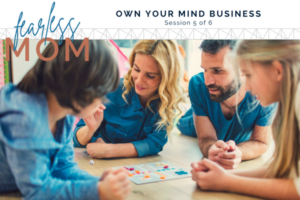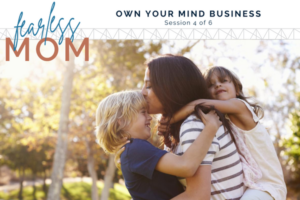Welcome to the second of our 6-part series, OWN YOUR MIND BUSINESS! Today, we’re going to learn how our understanding of self-control, mindfulness, and self-awareness takes us closer to the goal of emotional, relational, maturity, and spiritual health. Our goal is to raise kids with emotional resilience and self-control – kids who know how to OWN THEIR MIND BUSINESS.
I want to show you a picture that was taken when we were at the beach. I love this picture so much. You can see that both of my kids have freckles. I’m not surprised because, I, too, have freckles. My mom passed them to me, and I passed them on to Emily and Joseph. It wasn’t a decision that I made or something I did or didn’t do. It’s just genetics. That was out of my control.

While I couldn’t control whether or not I passed along freckles to my kids, there are some things I can control. If I’m not intentional and deliberate, then I could pass along other traits: habits, hurts, or hang-ups that I DON’T want my kids to have to deal with. And I work hard NOT to pass on these undesirable traits.
I’m 53 years young. And I’m still learning about and becoming more aware of my habits, hurts, and hang-ups that I don’t want to pass on. But what do we say in Fearless Mom? Instead of telling me what you DON’T want, tell me what you DO want. Let’s parent TOWARD A VISION instead of AWAY FROM A FEAR.
I don’t want my kids to struggle and wrestle with the same hurts, habits, and hang-ups I struggle and wrestle with… instead, I want my kids to live the full life they are created to live! A life of freedom, peace, hope, and joy. I want my kids to become emotionally resilient, competent, and independent adults. So, I parent toward that.
I embrace my responsibility to do my best to set them up for their best. I will do the work to equip and empower them to live their own lives.
Pay careful attention to your own work, for then you will get the satisfaction of a job well done, and you won’t need to compare yourself to anyone else. For we are each responsible for our own conduct. Galatians 6:4-5
And the best thing I can do to empower my kids with emotional resilience is to have it myself. And one of the primary building blocks necessary for emotional, relational, maturity, and spiritual health is SELF-CONTROL. We looked at the definition last week.
SELF-CONTROL: Owning the space between thoughts and actions, between feelings and behaviors.
Our theme verses throughout this OWN OUR MIND BUSINESS series are from Philippians 4.
Don’t worry about anything; instead, pray about everything. Tell God what you need, and thank him for all he has done. Then you will experience God’s peace, which exceeds anything we can understand. His peace will guard your hearts and minds as you live in Christ Jesus. And now, dear brothers and sisters, one final thing. Fix your thoughts on what is true, and honorable, and right, and pure, and lovely, and admirable. Think about things that are excellent and worthy of praise. Philippians 4:6-8
Self-control is recognizing and embracing the responsibility for the space between thoughts and feelings – learning to read our hearts and minds, then intentionally choosing actions and behaviors to express those thoughts and feelings.
Whether you have no space between your thoughts and actions, or no ownership of that space, you need to:
- Recognize and make note of your EMOTIONAL REACTION, your instinct, your reflex toward IMPULSIVE OUTBURST, or your instinct or reflex toward INTERNAL STUFFING.
- Work on your INTENTIONAL RESPONSE. Whether you have to learn to reel in to express your feelings or learn to speak up to express your feelings.
You need self-control to temper your thoughts and feelings and express them appropriately, and to trust your thoughts and feelings and express them appropriately.
Kelly McGonigal, the author of THE WILLPOWER INSTINCT, a book built on the class she teaches at Stanford University, THE SCIENCE OF WILLPOWER, says, “Everyone struggles in some way with temptation, addiction, distraction, and procrastination. These are not individual weaknesses that reveal our personal inadequacies—they are universal experiences and part of the human condition.”
Everyone struggles with willpower and self-control. But we also know that studies show that there is a very real connection between SELF-CONTROL and success, happiness, and even healthy relationships.
The Stanford “Marshmallow Experiment” was a series of studies in the late 1960s and early 1970s led by psychologist Walter Mischel. In these studies, a child was offered a choice between one small reward provided immediately, or two small rewards (i.e., a larger later reward) if they waited for a short period of approximately 15 minutes, during which the tester left the room before returning. They followed these kids for many years, and researchers found that children who were able to wait longer for the rewards tended to have better life outcomes:
- Higher SAT scores
- greater success in school
- healthier body mass index (BMI)
- future health, happiness, and success
Whether you have it naturally like some of these kids in the studies, or you don’t, I have good news: SELF-CONTROL is a cognitive skill that can be learned. It is like a muscle that, over time and with exercise, can develop! Even as an adult.
Don’t copy the behavior and customs of this world, but let God transform you into a new person by changing the way you think. Then you will know God’s will for you, which is good and pleasing and perfect. Romans 12:2
In addition to what neuroscience has learned about neuroplasticity – the ability of the brain to grow, change and adapt even in adulthood – we know that when someone steps into a relationship with Christ, she has access to the fruit of the Spirit, which becomes the overflow of someone who lives in a relationship with Jesus.
But the Holy Spirit produces this kind of fruit in our lives: love, joy, peace, patience, kindness, goodness, faithfulness, gentleness, and self-control. There is no law against these things! Galatians 5:22-23
In THE WILLPOWER INSTINCT, Kelly McGonigal says this in the final chapter. “If there IS a secret for greater self-control, the science points to one thing: the power of paying attention.” A great way to build self-control is to build the pre-frontal cortex with MINDFULNESS practices.
MINDFULNESS: being fully aware of the present and fully aware of thoughts, feelings, and sensations without judgment or comparison
MINDFUL PRACTICES
Mindful minute – focus on the breathing
Mindful meander – take a stroll and pay attention to the present
Mindful meal – take note of all 5 senses exploring your meal
Mindful media – you are the boss of your media, it’s not the boss of you
- Don’t look at your phone/tablet/laptop right when you wake up, instead, determine how long you’ll wait before looking at it.
- Turn off notifications and only check at predetermined times. It can be once daily, 3 times daily, 15 times daily…however often, just check at those times.
- Before checking email/texts/social media, determine how many minutes you will spend. Set a timer and stick to it!
DEVELOPING SELF-CONTROL
- SPOT THE SPACE: Work to SPOT THE SPACE between the thought & feelings and actions & behaviors. Simply recognize when you have a thought or feeling. Notice the thought or feeling and the space between your thought & feeling and the action & behavior that followed.
- OWN THE SPACE: Embrace the responsibility to OWN THAT SPACE. You’ve recognized it. You’ve taken note of it. Now OWN IT and do the work necessary.
- INCREASE THE SPACE: If your reflex is to react with emotion, work to increase the space. “Pause for poise” is what Mac’s basketball coach used to tell the players. “Stop. Think. Choose.” is what Fearless Mom Sherry Morrow tells her 5 children.
- UTILIZE THE SPACE: If your reflex is to stuff the thoughts and feelings, then work to express the thoughts and feelings in a productive, healthy way. Use the space to plan the words to express your thoughts and feelings.
While MINDFULNESS is key to developing SELF-CONTROL, so is SELF-AWARENESS. They actually work together.
SELF-AWARENESS is necessary for growth of any kind. If I want to get better at anything, I have to first see things are they truly are.
- your thoughts, feelings, and sensations
- your actions, behaviors, and habits
- your quirks, tendencies, and idiosyncrasies
- your likes and dislikes, your strengths and weaknesses
As we work to improve our own SELF-CONTROL, we must work on our SELF-AWARENESS, seeing our habits, quirks, etc. as they really are. So, your SELF-AWARENESS CHALLENGE this week is this:
Work to SPOT THE SPACE between your thoughts and actions, your feelings and behaviors. Are you OWNING THE SPACE? Do you need to INCREASE THE SPACE? Do you need to UTILIZE THE SPACE?




